Lady Gaga A Star is Born
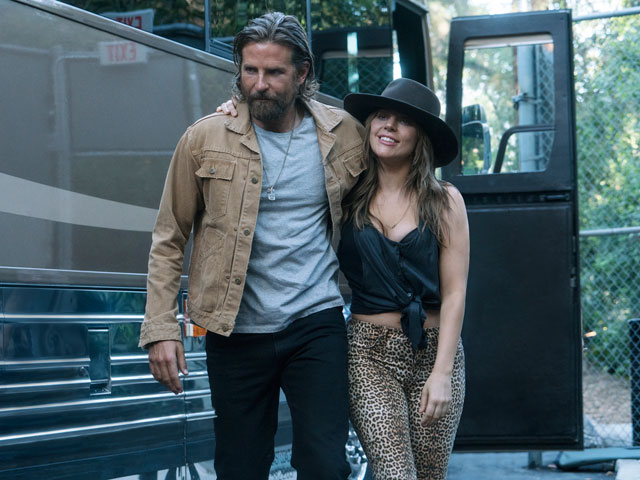
Bradley Cooper and Lady Gaga
Cast: Bradley Cooper, Dave Chappelle, Sam Elliott, Lady Gaga, Andrew Dice Clay, Anthony Ramos, Bonnie Somerville
Director: Bradley Cooper
Genre: Musical
Synopsis: In "A Star Is Born," Bradley Cooper and Lady Gaga fuse their considerable talents to depict the raw and passionate tale of Jack and Ally, two artistic souls coming together, on stage and in life. Theirs is a complex journey through the beauty and the heartbreak of a relationship struggling to survive.
In this new take on the iconic love story, four-time Oscar nominee Cooper ("American Sniper," "American Hustle," "Silver Linings Playbook"), makes his directorial debut, and also stars alongside multiple award-winning, Oscar-nominated music superstar Gaga in her first leading role in a major motion picture. Cooper portrays seasoned musician Jackson Maine, who discovers and falls in love with struggling artist Ally. She has given up on her dream to become a successful singer, until she meets Jack, who immediately sees her natural talent.
The film also stars Andrew Dice Clay ("Blue Jasmine"), with Dave Chappelle ("Ch-Raq") and Sam Elliott, whose nearly 50-year career includes standout performances in such films as "Mask," "Tombstone" and, most recently, "The Hero."
In addition to playing Ally, Gaga"who earned an Oscar nod for the song "Til It Happens to You" from the film "The Hunting Ground""performs original songs in the film with Cooper, which they wrote with a handful of artists, including Lukas Nelson, Jason Isbell and Mark Ronson. The music is original and all vocals for the movie were recorded live during filming.
A Star is Born
Release Date: October 18th, 2018
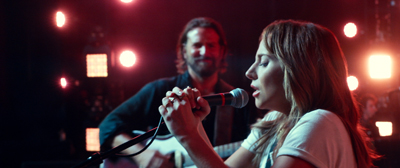 About The Production
About The Production
Ally
but they didn't like the way I look.
Jack
I think you're beautiful.
Putting his own stamp on the tale with his contemporary take on "A Star Is Born," director/writer Bradley Cooper strove to make something that speaks to the timeless nature of human feelings and failings, mixed with today's diverse world of music. In the film, a powerful soundtrack of original songs underscores every emotion, and an intimate lens captures each look and every touch. "I never thought, 'How do I make it original?' I just knew I had to make it authentic to tell the story I wanted to tell," says Cooper who, in addition to directing and co-writing the screenplay, and starring as Jackson Maine, produced the film. He also co-wrote some of the music, which he performed alongside Lady Gaga, who co-wrote much of it as well.
Though she loved his take on the story, Gaga"as experienced a performer as they come"was nervous to take on the role of Ally in her first feature film, but nevertheless thrilled to do so with Cooper at the helm and by her side. "I had to get past the nerves, but I was so excited," she relates, "because, in my opinion, when somebody has talent inside them, brewing for years, ready to move into another medium and it finally happens…it's like a huge explosion, an opus. He was meant to direct, and I just got lucky enough to be in his first film."
Cooper states, "She'd done incredible work as an actress, but to make this huge transition… It felt like we were at the same point individually in our work, and we both needed the same thing from each other, essentially, in order to jump the tracks to this other place."
Still, it's no easy feat, even for such accomplished individuals. As seasoned singer/songwriter Jack tells Ally when they first meet, "Talent comes from everywhere, but having something to say and a way to say it so that people listen to it, that's a whole other bag. And unless you get out there and you try to do it, you'll never know. That's just the truth."
In the film, Maine's philosophy is intended to encourage the skittish ingenue to step into the spotlight, figuratively and literally. It could also be Cooper subtly revealing through his character why this story motivated him to finally test his own wings behind the scenes.
"I've always known that I wanted to direct, but I also knew that I needed to have a point of view, to know why I was doing it, otherwise there was no reason to," he says. "And I always wanted to tell a love story, because it feels like something everybody can relate to"the love, the loss of it, the high of it. It's the thing that makes you feel the most alive.
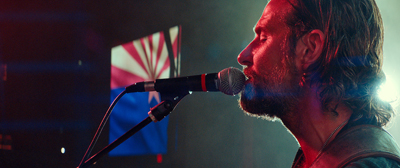 "Coupled with that is music"not just music, but singing," he continues. In fact, Cooper and Gaga made a pact early on to record all their performances in the film live"no lip-syncing to a track. "There's something about singing that's so honest…you can't hide at all. I thought that those two things could be put together in a way that maybe I'd find my point of view."
"Coupled with that is music"not just music, but singing," he continues. In fact, Cooper and Gaga made a pact early on to record all their performances in the film live"no lip-syncing to a track. "There's something about singing that's so honest…you can't hide at all. I thought that those two things could be put together in a way that maybe I'd find my point of view."
Producer Bill Gerber states, "Bradley didn't really base his decisions on what went before him, but on how this version of the movie would work. What always resonated with me, and with him, is that it is not simply a rags-to-riches story, or a cautionary tale about the perils of fame; it's a love story, and this is Bradley's vision mainly born out of conversations he had with Stefani," he says, using Gaga's given name, "about who they are as artists. It's by no means autobiographical, but that's what really paved the way for the story we're telling."
Anyone who has ever been in a relationship has experienced the complexity of intermingling lives along with fears, joys, doubts, anger, hopes. Will Fetters, who worked with Cooper on the script, says that key for him was "understanding what's beneath the surface for these characters, what motivates them, what are they doing that's making me feel for them and what exactly am I feeling, and why? This is about an epic love between two flawed individuals on different trajectories in life who find each other, and I found myself, through them, just wanting to explore the basic human emotions beneath all the glitz and fame. Why are we fascinated with the famous and what does our fascination feel like for them, what does it do to them?"
"This film pulls back the curtain on what it means to be both a star and a rising star in this business today, and Bradley is not your typical first-time feature director," observes producer Lynette Howell Taylor, who has worked with Cooper before. "You're talking about an actor who's been in the entertainment industry for years, who's lived with a level of renown, while also soaking up knowledge from the likes of David O. Russell, Clint Eastwood, Todd Phillips and Derek Cianfrance, and honing his own craft as a producer. He's a real collaborator, he learns, he pays attention. So, by the time he was ready to step into this role, he was more than ready, and it wasn't at all surprising to me that he'd dive into something that would challenge him and push him, and that would be big and spectacular as well as relevant and current."
Producer Jon Peters, whose initial experience with "A Star Is Born" was with the preceding version, worked for some time with Gerber to bring the story to modern audiences. He recalls, "When Bradley got involved and wanted to direct, he took the bull by the horns, so to speak. Through his perseverance, he put all the pieces together. Lady Gaga was a fan of his, and we were fans of her and felt she had the potential to make this a breakthrough movie as an actress. People throw around the word 'revelation,' but I think this just might be one."
To translate the awesome nature of what it's like to be among the world's most popular musical artists performing in arenas around the world before tens of thousands of fans, the filmmakers shot in such iconic locations as Los Angeles's Greek Theater, The Forum and The Shrine Auditorium, and on the stages of the Coachella and Stagecoach music festivals, as well as "Saturday Night Live." Cooper turned to celebrated cinematographer Matthew Libatique to capture both the intimacy and the spectacle of Jack and Ally's world, and production designer Karen Murphy and costume designer Erin Benac h to bring it to life.
Cooper surrounded himself with an equally impressive ensemble cast. In addition to Gaga, he tapped the likes of Sam Elliott, Dave Chappelle and Andrew Dice Clay to play roles critical to understanding who Jack and Ally are and where they've come from, along with Anthony Ramos as a friend who's got Ally's back, and Rafi Gavron as a manager who steers her toward her future.
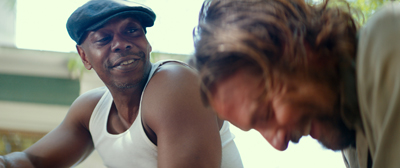 Tell me something girl / Are you happy in this modern world /
Tell me something girl / Are you happy in this modern world /Or do you need more / Is there something else you're searching for
When the film opens, we see Jackson Maine as he's about to go on stage"but not without first swallowing a few pills, easing them down with a swig of alcohol. It plays like the longtime ritual it has become for him, but his connection to the crowd and his performance are undeniably of the moment. He's a star.
The first time Jack sees Ally, she's performing "La Vie En Rose" at a bar he's wandered into in search of booze, and where every other performer is in drag. Even Ally has altered her looks to fit in as best she can. But it's her voice that stands out. No lip syncing to the greats, she simply is one. Jack drinks her in, immediately stuck by the power and purity of her voice.
"When Jack comes backstage after he sees Ally singing, she's a little flustered. She doesn't understand what's going on or why this famous musician wants to have a drink with her," Gaga offers. "She's overwhelmed."
That night, circumstances find them getting to know one another in a cop bar and a supermarket parking lot. Unromantic locales aside, it doesn't take long for Ally to take the measure of the man at her side.
"She starts really opening up to him, and he's telling her how beautiful she is and she still kind of doesn't really believe him…but she's trying to," Gaga says.
Ally isn't the only one who opens up. Cooper adds, "That's what I've always loved about their first night. He tells her things I don't think he's ever told anyone. This is not a guy who talks about that stuff and all of a sudden he's talking about it to her. They just met, but there's this chemistry, this synchronicity, that's occurred, and they both wind up letting their guard down. Over time, they're constantly putting it back up, and then it's down, and then up again. It's just a huge tsunami of emotions that they both give over to that's going to be their plight throughout the story."
Gaga observes, "She's enamored of him, but very quickly there's a human connection and the star-struckness starts to fade away. She even has the audacity to touch his face."
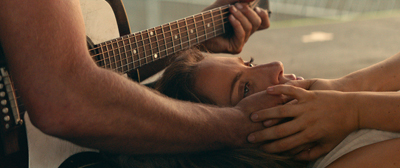 To enhance the immediacy of Jack and Ally's connection, Cooper chose such moments to linger on. He explains, "There's the initial energy of it when she turns to him on the bar and looks at him for the first time. We shot that at 48 frames"it's more the way she's looking at him than the way he's looking at her, and Jack even talks about it later, the impact of it. Another thing we did was to go close up on any time in the beginning of the relationship that's tactile: when he touches her nose, when he's wrapping her hand, when she touches his ear. You always remember the first touch of somebody, because it either sends a chill down your spine or it's a dead fish. But for them it's chills, which is good," he laughs.
To enhance the immediacy of Jack and Ally's connection, Cooper chose such moments to linger on. He explains, "There's the initial energy of it when she turns to him on the bar and looks at him for the first time. We shot that at 48 frames"it's more the way she's looking at him than the way he's looking at her, and Jack even talks about it later, the impact of it. Another thing we did was to go close up on any time in the beginning of the relationship that's tactile: when he touches her nose, when he's wrapping her hand, when she touches his ear. You always remember the first touch of somebody, because it either sends a chill down your spine or it's a dead fish. But for them it's chills, which is good," he laughs. Tell me something boy / Aren't you tired trying to fill that void /
What do you need more / Ain't it hard keeping it so hardcore
"Is that me?" Jack asks, after Ally softly sings the above lines to him.
"That's you," Ally replies. Though they've just met, she's already begun to see him clearly.
"When they're sitting in the parking lot together and she sings to him…" Gaga remembers, "to me, that's when she first begins to fall in love with him, because he's just a sweet guy and he's so lovely to her."
Like the characters they play come to do, Cooper says he and Gaga "relied on each other in every single way. I knew every time we did a musical number, I had this undeniable force in her, and I knew there was no one else who could've played the part. Her talent, her work ethic honed from years of performing… As a storyteller, you're just so thankful you cast the right person, but we were truly in this together, and that's the way we approached every scene and every song: as partners."
Gaga relates, "The very first thing we said was, 'Okay, now you're a musician and I'm an actress. We're making that exchange, so keep me in a comfortable yet vulnerable, raw place where I can give you what you need for the character. He did that for me, and as we worked on creating the songs, I watched him become a real musician."
In one of Jack's fan-favorite songs, the chorus goes, "It takes a lot to change a man and it takes a lot to try; maybe it's time to let the old ways die." For a man thoroughly set in those wayward ways, it seems Ally may be worth trying for.
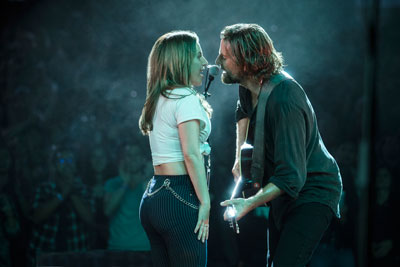 "Almost right away, Ally understands that Jack lives this very complicated life, and she gets very protective of him," says Gaga.
"Almost right away, Ally understands that Jack lives this very complicated life, and she gets very protective of him," says Gaga. The story offers a glimpse into what can sometimes happen to those who live their lives backstage or beyond the velvet ropes, literally and figuratively. Jack has lived there for a long time and has been damaged by it: for starters, he has tinnitus, a painful condition only exacerbated by years of full throttle amps pulsing in his ears on stages around the world. And while his popularity hasn't waned and his musicianship appears strong as ever, he may soon find his career has joined him at the bottom of a bottle, broken, with no one to fish either one out.
Though Ally and Jack's entire journey is an emotional one, for one pivotal scene for Cooper's character, Gaga went above and beyond to support her co-star. "I knew it was a tough scene and I had gotten Bradley roses, so I watched part of it and then I left them for him where he'd find them," she says.
"Oh, man, that was great," Cooper acknowledges. "I think I actually felt her departure and I thought, 'Wow, I'm on my own here.' And then I walked up to the truck, because Jack gets into his truck, and I opened the door and saw the roses. She'd left them on the passenger seat."
I'm falling / In all the good times I find myself longing for change /
And in the bad times, I fear myself
In the film, it's probably Jack's brother, Bobby, who has seen him in, and through, the best and worst of times. Throughout their relationship, Bobby has not only been Jack's older brother, but also his surrogate father, manager, counselor, and probably even drinking buddy. A talent in his own right at one time, it's evident he gave up any aspirations he held for himself to usher his more gifted little brother through the highs and lows of being a rock star. But such a sacrifice has left a bitter taste for both men that even brotherly love can't always completely overcome.
Sam Elliott, one of the industry's most respected actors of the past five decades, stars as Bobby, and Cooper reveals, "I wrote the whole part for Sam. In fact, if he didn't play it, I would've been in real trouble, because I really wanted to see him play a character that was filled with resentment as opposed to somebody filled with wisdom, and he was able to walk that fine line in such a beautiful way"to play a man filled with love and resentment throughout the whole movie."
Despite having the part written for him, Elliott had never actually met Cooper before they met to discuss the film. "Bradley is one of the good guys in this business. I've always suspected that, and early on in our first encounter, I knew that I was right. He was engaging, gracious, and direct, and he had me from the start," Elliott remembers. "We talked about work, we talked about our mom's, and we talked about his vision of 'A Star is Born,' and how I might fit into that."
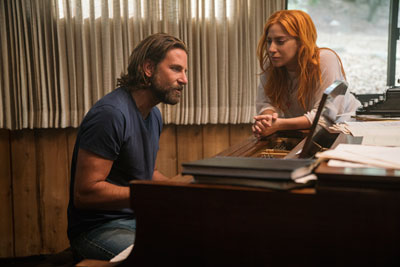 By that time, Cooper had already begun work with dialect coach Tim Monich to develop Jack's rich timbre, noticeably lower than his own voice and clearly very much in Elliot's register. "Having met many iconic musicians, one thing I know for certain is that they walk in a room and all the energy goes to them," Cooper says. "The audience has to feel his presence the minute Jackson Maine enters the movie, and one instinct I had was to lower my speaking voice. I worked with Tim on 'American Sniper,' and he's incredible. We spent months on Jack's voice, and I think I lowered my range an octave. But it's fun, because the minute you lock into the voice, everything else about the character follows."
By that time, Cooper had already begun work with dialect coach Tim Monich to develop Jack's rich timbre, noticeably lower than his own voice and clearly very much in Elliot's register. "Having met many iconic musicians, one thing I know for certain is that they walk in a room and all the energy goes to them," Cooper says. "The audience has to feel his presence the minute Jackson Maine enters the movie, and one instinct I had was to lower my speaking voice. I worked with Tim on 'American Sniper,' and he's incredible. We spent months on Jack's voice, and I think I lowered my range an octave. But it's fun, because the minute you lock into the voice, everything else about the character follows." Apparently, Cooper did an excellent job that, proven during that first meeting with Elliott. "He played this recording of him reading and having a conversation with his voice coach. As I listened to it, I was dumbfounded at how much his voice sounded like mine," Elliott says. Cooper also shared some footage of himself working with Gaga. "He showed me a clip on his phone of him and Stefani singing while sitting at her piano. Again, dumbfounded at the beauty of it.
"It's all about the work with Bradley," Elliott continues. "Getting at the truth. Being honest. He's a collaborator, he's generous, and you can trust him. You just want to give it to him, because he is simply such a good guy."
Along with the characters' outward similarities, Elliott's deft portrayal of Bobby quietly fills another role in Jack's life: his conscience. If Jack seeks the truth, he need only look his brother in the eyes. It's easier to look away…for both of them. "And then there is the girl. Jack is smitten by her the minute he sees her, hears her, and then deeply in love the next. They both write and both understand the value of that to their music. It's all perfect for a moment. But Jack just can't come to grips because of his old devils, and that's the heartbreaker for everyone, including brother Bobby."
Though familiarity has certainly bred contempt between the brothers, Bobby isn't entirely without wisdom and can see the difference between his take on the world and Jack's. In one of Elliott's favorite moments, Bobby tells Ally that Jack once said to him, "Music is essentially twelve notes between any octave; twelve notes and the octave repeats. It's the same story told over and over. All any artist can offer the world is how they see those twelve notes." Another gift from Jack, the man who has offered her, and the world, so much, while struggling to hold back just a little for himself. It's at a particularly difficult moment for Jack that he finds himself quite literally dropping in on an old friend, George "Noodles" Stone.
The pivotal role is played by Dave Chappelle, who relates, "Noodles represents a different path Jack might have taken in his life, but didn't. It's the kind of path that I, personally, took in my life" the guy that had the fun and then wanted to settle down and have a family. Noodles got off the merrygo-round."
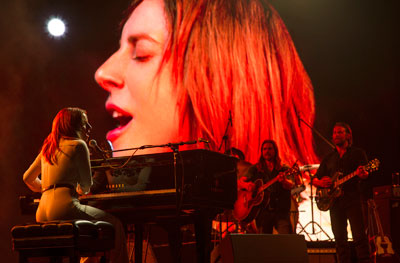 It's a fact which Noodles, perhaps by way of explaining his own choices, rather poetically offers Jack after he pulls him up off his front lawn, saying of Ally, "Maybe she's a way out… You float out at sea and then one day you find a port. You say, 'I'm gonna stay here for a few days.' A few days becomes a few years, and then you forgot where you were going in the first place, and you realize you don't really give a shit about where you was going, 'cause you like where you're at." Chappelle himself goes on to posit that "good friends in your life are like oxygen, and for a person that's as famous as Jack? That kind of fame could be suffocating. And he's got addictions, too, so all the things Jack struggles with can be suffocating. Going back to an old friend is like running to get air. But he passed out right before he got to the surface."
It's a fact which Noodles, perhaps by way of explaining his own choices, rather poetically offers Jack after he pulls him up off his front lawn, saying of Ally, "Maybe she's a way out… You float out at sea and then one day you find a port. You say, 'I'm gonna stay here for a few days.' A few days becomes a few years, and then you forgot where you were going in the first place, and you realize you don't really give a shit about where you was going, 'cause you like where you're at." Chappelle himself goes on to posit that "good friends in your life are like oxygen, and for a person that's as famous as Jack? That kind of fame could be suffocating. And he's got addictions, too, so all the things Jack struggles with can be suffocating. Going back to an old friend is like running to get air. But he passed out right before he got to the surface." Surprisingly, Chappelle had not only never seen a prior version of the story, but wasn't even aware they existed. "I really didn't know anything about it, but I imagine there's something about seeing people fall in love, and the idea that one person could go from obscurity and become famous through this mentorship. This loving relationship where one person teaches the other how to become their best self…that resonates powerfully."
"I had met Dave when I was doing a play in London and he came to see it," Cooper reflects. "I'd always been a huge fan, and we wound up spending the whole night talking. There was something about our dynamic that I just loved, and knowing I was going to be making this movie, I thought, 'He's gotta play Jackson's old musician friend.' I was so happy he said yes, and he delivered in such a massive way, such a humorous, dramatic, soulful way. It's one of my favorite scenes in the movie."
"I loved the culture on Bradley's set, the looseness of it, the fact that he surrounded himself with people he trusted artistically," Chappelle notes. "He helmed his vision but wasn't afraid to try something or go with something different than what he had planned if he liked it better, in that moment. He's very spontaneous and, as a comedian, that's one of my favorite things to witness."
Chappelle met Gaga for the first time during production. "Her talent is very powerful to witness close up, and she struck me as a thoughtful, deep-feeling person," he says. "And I think she has one of the purest relationships with her fans of any artist that I've met. She advocates for those kids and they take care of her."
Though known primarily for his dramatic work, Cooper's lifelong love of comedy"stand-up comics, specifically"led him to seek out another comedian for the role of Ally's dad, Lorenzo: Andrew Dice Clay. "I memorized Andrew Dice Clay's comedy tapes when I was in the eighth grade, and would recite them"to the chagrin of my friends," Cooper smiles. "But I've always observed him as a very talented actor and I've seen every movie he's ever made, so it was a thrill for me to work with him."
As one who has spent time in and out of the spotlight, Dice says of the story, "I think it's even more relevant today than ever, because of what has happened with social media now. Everybody wants to be a star, everybody's looking for those 15 minutes and all they want is to go viral. That's the aim of everybody holding a phone, which is everybody in the world today.
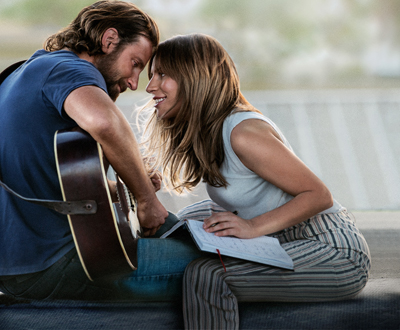 "But fame"real fame"is a funny place to be," he continues, "and anybody that gets real fame understands that. It can be scary, and you need your crew around you because anything can happen when the whole world knows who you are."
"But fame"real fame"is a funny place to be," he continues, "and anybody that gets real fame understands that. It can be scary, and you need your crew around you because anything can happen when the whole world knows who you are." Dice's role as Ally's father naturally put him in scenes with Gaga. Cooper facilitated their first meeting at a studio in Hollywood, which began with light conversation before transitioning into what appeared to be light scene work. "Then he made us both do this really heavy scene," Dice says, "and I was breaking down crying. I know this girl for half an hour and I'm holding her and my tears are falling on her. But Bradley was crying, too. We're both very sensitive guys."
In the story, Lorenzo is a supportive father, but a protective one as well, careful not to let his daughter's hopes get too high. When he says of Ally, "With a voice like from heaven. But you know what? It's not always the best singers that make it," he's likening her to the big stars of his own generation"guys who sounded like Sinatra, but didn't have the looks, the sharkskin suit, the blue eyes. Cushioning the blow in advance, as dad's do, without realising the words might hurt.
"I'll never forget working on that scene," says Gaga. "He took me right back to how I used to feel when I would go to auditions as a kid"I actually wanted to be an actress before I wanted to be a singer"and I never got close to getting a callback or a role. In that moment, I think you really see in Ally someone who feels extremely defeated by the music industry. She does not believe in herself. She doesn't think she's beautiful or that her voice matters. So, there's that moment when you see Lorenzo try to lift her up, to make her feel good. But it's not making her feel good. It's just reminding her that she's in her 30s and she hasn't made it."
Before she meets Jack, Ally's staunchest supporter is her friend and coworker, Ramon, played by versatile actor Anthony Ramos. "Ramon is Ally's cheerleader, the kind of friend we all need, the one who's cheering for you purely because they love you so much, not because they want something from you, not because they owe you something. Just because they want you to win," he says.
"Ramon brings such light to Ally and helps her believe in herself," Gaga says. "Each time in the film where she's about to step out and have a moment, he's there to lift her up, and when she's falling apart, he's there to ground her, to remind her who she really is. And Anthony is so genuine; I think in those moments we were acting, but we weren't really acting."
In truth it's Ramon who promotes Jack's initial meeting with Ally. "Ramon sees Jackson Maine outside the drag club and takes him inside, exposing him to a world he's probably never been exposed to before," Ramos surmises. "He sees how Jackson reacts to Ally's performance and that's really gratifying for Ramon, because he knows how talented Ally is. He takes him to meet her, and he's also the one who encourages Ally to give the guy a chance."
And to give herself a chance, too. Standing in the wings as Jack tries to lure her to perform with him the first time, Ramon gives his friend a push in the right direction"onto the stage. But it's a well-regarded music manager who will pull her along even further as he edges her into a career as a solo artist.
Having known Cooper for more than 15 years, Rafi Gavron took on the role of the man who is more often than not at odds with Jack, Rez Gavron. The last name was no accident, and the actor is eager for his family to see the movie. "There's a scene where Ally is on stage and says, 'I want to thank my manager, Rez Gavron," so I think the Gavrons are going to have a fun time with that, getting the shout out," he imagines.
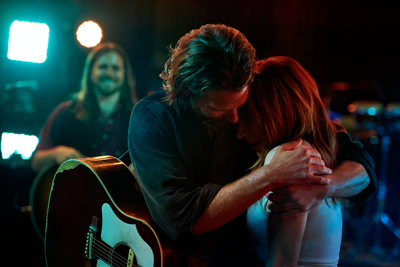 With experience comes knowledge, and Gavron says his character "knows everything about Jack. All his successes, all of his pitfalls. He respects him as a talented musician, but he knows Jack has problems with addiction and his main concern is whether that will get in the way of Ally's potential to succeed. He's seen it before. Jack's in love with her, but Rez is in love with her talent. His belief in her is so extraordinary, he needs the world to hear her. So, he has something to protect, too."
With experience comes knowledge, and Gavron says his character "knows everything about Jack. All his successes, all of his pitfalls. He respects him as a talented musician, but he knows Jack has problems with addiction and his main concern is whether that will get in the way of Ally's potential to succeed. He's seen it before. Jack's in love with her, but Rez is in love with her talent. His belief in her is so extraordinary, he needs the world to hear her. So, he has something to protect, too." "Rez is really part of Ally's own musical journey, part of her coming from a place of self, evolving her music and even her appearance beyond the scope of what Jack has done for her," Cooper says of the character who is often put in almost a good cop/bad cop position. "A lot of what Rafi did was improvised, and he did a brilliant job illustrating how an artist gets influenced by other people and goes into new worlds."
Unlike in other versions of the tale, it is Ally's choice to take her career in another direction, not Jack's resentment toward her meteoric rise, that comes between them. She's forging her own path; he thinks she's selling out, and selling herself short.
"Rez wants Ally to get out from behind the piano, to work with a choreographer, and she comes around to his way of thinking," Gaga says. "Something like that happened to me, and to many others, I'm sure. The story is very honest in that way."
The film also features a host of cameos from the worlds of screen, stage and music, including Ron Rifkin, Greg Grunberg, Eddie Griffin, Luenell, D.J. Shangela Pierce, Derek Kevin Jones, William Belli, Marlon Williams, Brandi Carlile and Halsey.
Appearing with Jack as an aptly termed "super group" in a performance at the Grammys are such venerable musicians as Don Was, Victor Indrizzo, George Doering, Michael Bearden and Lenny Castro. And starring as Jack's band in the film are Lukas Nelson & Promise of the Real.
I'm off the deep end / Watch as I dive in / I'll never meet the ground…
"One of the things Stefani brought to this production was the world of music," Cooper states. "She would say, 'We should work with this person,' and 'This person would be great for this,' and all of a sudden it became so easy for me. She did all the legwork, and then I was able to just walk into the room."
"We had a studio to work in and we filled it up with all of the best writers," says Gaga, "and we had a lot of songs for this film. We even wrote while we were filming. I started writing 'I Don't Know What Love Is' after we shot the scene in the cop bar, because I was so overcome with emotion from shooting that scene. I was actually using Ally's prop"I'd asked if I could keep my prop notebook"and I wrote it down in there. Then Lukas and I finished it."
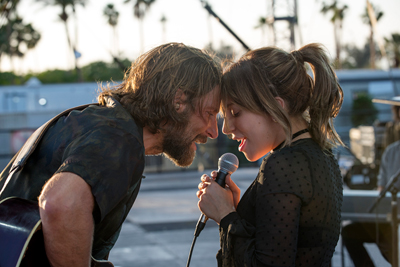 Lukas Nelson, son of legendary country music star Willie Nelson, had worked with Cooper and Gaga to write and produce many of the original songs for the film, so it seemed natural that he and his bandmates from Promise of the Real"Anthony LoGerfo, Alberto Bof, Corey McCormick and Tato Melgar"would also double as Jackson Maine's band in the film.
Lukas Nelson, son of legendary country music star Willie Nelson, had worked with Cooper and Gaga to write and produce many of the original songs for the film, so it seemed natural that he and his bandmates from Promise of the Real"Anthony LoGerfo, Alberto Bof, Corey McCormick and Tato Melgar"would also double as Jackson Maine's band in the film. "Bradley gave us an idea of some scenes that needed music, and that he didn't want direct references to the characters or things that were happening in the movie to be in the songs," Nelson remarks. "He wanted them to be subtle, to be able to stand on their own."
That meant steering clear of using lyrics as dialogue, as well as any gratuitous songs. "There's no point in the film where any lyric is sung that isn't directly related to the emotional moment in the movie in which it's occurring," Cooper attests. "They're singing only words that have to do with exactly what their fear is, their hope, their dream, in that moment. It's essentially part of the script, but it's not the script."
"Stefani and I just started writing like crazy," Nelson says. "She's an incredible writer, a lyric al genius, and we really connected as artists. Our minds work alike, and sometimes even the same word would pop into our heads. And Bradley's really adept at the music, too, so between the three of us, creating the music for the project was a collaboration."
Part of Cooper's process was to develop a musical style and sound for Jackson Maine, which Nelson helped him accomplish. "He's a huge Neil Young fan, so we mixed his sound with The Who's Pete Townshend, to find the specific guitar work for him," says Nelson. "We thought about Waylon Jennings and The Strokes. It was very deliberate and at the same time not any one thing, just authentic to his character, and Bradley worked hard, but he also proved to be a real natural musician."
During the process, it was important to Gaga that Cooper never felt like anyone was trying to make him into a particular type of musician. "She really protected me in a big way," he says. "She knew that I would find whatever Jack's sound was if I was just allowed to keep exploring."
The tactic worked. Nelson says that "Black Eyes," the song that opens the film, came together almost in an instant. "Bradley and I wrote that song together in the studio, with the band there. I started playing this lick and he started singing these lyrics, and it just came together."
Cooper took guitar and piano lessons, and voice lessons from vocal coach Roger Love. "Singing's not easy," Cooper admits, "especially singing in front of a lot of people. Initially after one verse, I was out of breath. I had to spend five days a week for six months learning how to sing, and not as me but as Jackson."
Jackson Maine's centerpiece song, the thought-provoking "Maybe It's Time," was written by Jason Isbell. And Gaga worked closely with such industry heavyweights as Mark Ronson, Anthony Rossomando and Andrew Wyatt to pen what would essentially become Ally and Jack's theme, "Shallow." The song is woven into the film in pieces before it's fully realised, beginning with a few lines Ally comes up with in the parking lot as she begins to get a read on Jack.
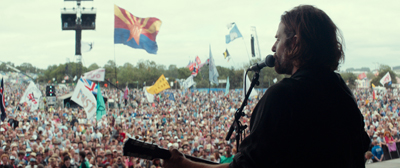 Crash through the surface / Where they can't hurt us…
Crash through the surface / Where they can't hurt us…It was important to Cooper that the film's cinematic style have a first-person perspective, with the hope of giving the audience the ability to experience the intoxicating energy of performing live before a crowd. To achieve this sensation, Cooper and director of photography Matthew Libatique chose to film all performance sequences from the perspective of the performers: that meant the singers' and musicians' immediate POV and onstage interactions with each other. No wide shots of concerts from the audience perspective; the lens would live inside the performance.
Gerber states, "Bradley took a very specific approach with how he told the story cinematically. There are certain angles from traditional concert movies you'll never see in this film. Instead, he and Matty put you in the middle of what it feels like to start becoming famous, what it feels like to have been famous for a long time, and what it feels like to lose that. It's very visceral."
Libatique has shot his fair share of music and concert videos as well as feature films. "He's an artist," Cooper states. "I got to meet him through Darren Aronofsky, who he has done many films with, and we hit it off right away. I told him we wouldn't have a lot of days and we'd be moving fast, here's the color palette I see, here's a little about the opening composition, and he just got it."
Libatique incorporated various shooting techniques, including handheld, Steadicam, long tracking shots following Jackson Maine from backstage to onstage, and so on, frequently keeping the focus extremely up close and personal on its subjects. "Thank God for Matty and his crew, they were incredible," Cooper emphasizes. "And our camera operator, Scott Sakamoto. I found myself watching him operate, he's like a dancer. One of the greatest of all time."
To complement the visuals, sound mixer Steve Morrow worked to architect the sound design in a manner that allowed a seamless transition from backstage to center stage, as musicians do, without any audible breaks. He elaborates, "In more traditional music movies, there's a sense that when the music starts, you're in a different world, audibly, and Bradley and Stefani wanted to avoid that.
Audiences are increasingly more sophisticated, they notice certain things. From my view, the worst thing is to be pulled out of the movie because of a playback track. Bradley didn't want audiences standing outside of this world, watching it take place. He wanted them to be fully on the inside."
With that goal in mind, it was critical that the vocal performances were recorded live on the day of filming. Therefore, what is seen and heard vocally in the film was all recorded on the day.
"There something about the purity of a live vocal," Cooper asserts. "And all the vocals in the film are live, nothing's pre-recorded, and I think that is how we captured the truth in each performance."
The pre-recorded musical tracks were only heard by the performers through small earwigs; the band pantomimed their playing while Cooper and Gaga sang live. In addition to the standing microphones on stage, Morrow and his team planted an extensive web of sensitive recording devices on and around the stage at each venue. "It isn't normally done like that," he acknowledges, "but we wanted to provide as much raw material as possible, so we took the added steps to achieve what Bradley was looking for."
If the camera and sound recording processes could be that authentic, so, too, could the locations. "We had explored the idea of doing certain things on soundstages, because there's certainly a lot more control in terms of noise, lighting, things like that," recounts Gerber. "But it just so happened that we started finding great locations, and the venues were incredibly cooperative and supportive of us filming there, so there was no reason not to go do it in the real places these things happen. It's a bold way to start production, but it turned out to be surprisingly less complicated than we initially thought."
The production worked closely with AEG and Golden Voice to plan and execute the logistics. Principal photography commenced in Indio, California, where the crew spent the first week filming on the extensive grounds of the Coachella Music Festival, between the two festival weekends. The potential complexities of shooting there were made exponentially easier by the fact that the festival headliner was none other than Lady Gaga.
Utilizing the multiple stages, equipment and infrastructure already in place gave the production the ability to capture large set pieces that couldn't have been easily duplicated. "The equipment, lighting rigs, and backstage areas already existed, so we were able to go into that environment and shoot it as-is," explains Howell Taylor. "Going into real venues gives the movie the kind of legitimacy that, even if you had all the money in the world, couldn't be recreated in the same way."
For the raucous Jackson Maine performance that opens the film, Cooper and a skeleton crew took over the mainstage of the Stagecoach Music Festival to film a brief performance between the sets of Jamie Johnson and Willie Nelson. Without an introduction or audible track heard through the speakers, the performance scene was already over by the time the unsuspecting crowd caught on that actor Bradley Cooper was on stage performing.
The trick was later repeated at a massive European music festival. "Oddly enough," Cooper states, "Kris Kristofferson played the summer we were there, and he was kind enough to let us take a couple of minutes of his set.
"Now, singing live in front of the crew is daunting, but 20,000, or even 80,000 people?" he continues. "I have to give a shout out to Steve Morrow because every time, right before we did it, I'd say, 'Maybe I should just lip sync,' and he would say, 'What are you talking about? You gotta sing live!' And I did. And in England I got to perform on the stage where I'd seen Robert Plant, Jack White, Thom Yorke… But the best part about it was, after it was over, I got to say, 'Ladies and gentlemen, Mr. Kris Kristofferson.' Then he walked out. I'll never forget that."
Other large performance spaces used during filming included the Shrine Auditorium, the Greek Theater, the Regent Theater and The Forum. Filming in large venues that house mass audiences presented creative challenges to the production. So, rather than bringing in thousands of extras, the production team found a way to fill the seats by utilizing a priceless resource: Lady Gaga's dedicated fan base.
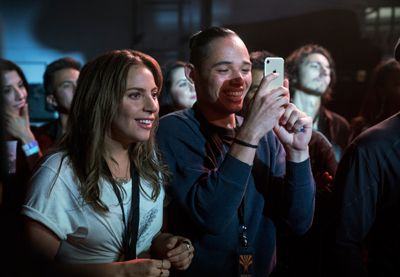 Affectionately referred to as her "Little Monsters," Gaga's fans had the opportunity to participate in the filmmaking process as audience members. Tickets were sold for each of the venues, with all proceeds benefiting Lady Gaga's Born This Way Foundation, and the filmmakers benefitted from the genuine enthusiasm of her fan base. And while having a live audience for filming provided the visuals and energy needed, those lucky enough to have stayed until the end of one particular night at The Greek experienced a once-in-a-lifetime, private, impromptu piano performance of two of Lady Gaga's hit songs"her way of thanking her fans for their time.
Affectionately referred to as her "Little Monsters," Gaga's fans had the opportunity to participate in the filmmaking process as audience members. Tickets were sold for each of the venues, with all proceeds benefiting Lady Gaga's Born This Way Foundation, and the filmmakers benefitted from the genuine enthusiasm of her fan base. And while having a live audience for filming provided the visuals and energy needed, those lucky enough to have stayed until the end of one particular night at The Greek experienced a once-in-a-lifetime, private, impromptu piano performance of two of Lady Gaga's hit songs"her way of thanking her fans for their time. Because of the shooting style and artist-oriented perspective, each location was utilized in various ways and played as different venues. "It was clear that Matty was going to shoot a lot of handheld, which provides viewers the ability to see everything in great detail, from the dressing rooms and bowels of a theater all the way to the stage," notes production designer Karen Murphy, who was intrigued by the idea of visually representing the journey of an artist. "As with every other aspect of the movie, from the beginning it was always about authenticity and perspective. Bradley and I spoke of how important it was to see the rise of a pop star from her own point of view, being on the inside of fame when it happens quickly and experiencing everything for the first time."
Murphy, who is not from L.A., drove around quite a bit to get the look and feel of several of the locations. "Los Angeles has so many beautiful areas and they're all very different, which, to me, as an outsider, was unique."
She discovered a house on Kensington Road in the Angelino Heights/Echo Park area, which became the house where Ally lives with her father, a limousine driver who operates his business from home. "It needed to feel like a family lived there but not be a mansion, and I liked the homes in that area. It's high, it overlooks downtown Los Angeles, which gives it an interesting outlook from the street, and we were going to utilize the outside as well so we'd see a view."
By contrast, Jackson Maine's house is secluded"even his brother Bobby has trouble finding it in the woods. "I didn't feel like an L.A.-style mansion was appropriate for Jack," Murphy notes. "He had roots in Arizona, he's a very earthy guy, his music is earthy…I just wanted to find somewhere that felt like him without thinking about scale or a fancy address, but somewhere isolated where he would write and make beautiful music. I think he's essentially lived on his own for a long time and he would need a warm, centering place, this guy whose life is somewhat amiss."
Murphy incorporated a lot of wood in the non-concert environments. "I didn't want things to pop too much. I watched a lot of music documentaries that include the places where artists are making their albums, just to get insight into their lives and to see what they've got all around them in general. It was rarely about fashion or color or any one thing in particular, just real environments, and you can't always choose a palette in a real environment. You just fill it with their stuff, the things they would have."
That's not to say his isn't a lovely house. "It's beautifully dressed, very warm, very lovingly put together. He has this rich life, but everything is from his life on the road"posters from his tours over the years, that sort of thing."
To capture the experience of following artists on the road and onto the stage, Murphy says, "I thought it was important to have an actual tour manager work with us"with the art department, the set dressing department"because we were setting up for real concerts. The producers found Eric Johnson, who has worked with Neil Young, and he became part of the team, a great advisor."
Costume designer Erin Benach faced very different challenges for her work on the film, most notably, she says, was "trying to foresee fashion that would not be out of date two years down the road, ultimately creating a timeless look; I knew all eyes would be on Stefani and it was important to let her character be the main focus."
Like her fellow designers, Benach explored at length the characters' histories leading up to the start of the film in order to determine where they would be when the story begins. "We loved the idea that Jack would have a very small closet and a silhouette he rarely ventures out of. We called it a uniform, actually. He's not trying to impress anyone anymore. You can almost imagine he doesn't think about his clothing, that he has three pairs of pants, four shirts, one jacket and an air of nonchalance about him. You'll never see him picking out his clothes."
With such a short order, it's surprising that all of Jack's clothes were created. "We built all of Jacks clothes. You might not think of his wardrobe as completely bespoke"but it was!" Benach assures. "All of his jeans had to be the right line for the boots. We built his leather belt, his shirts, which were kind of a hybrid of a `70s shirt and a modern-day shirt. All the fabrics have a heavy drape to them to make him look a little gaunt, a little messy. He feels a bit like he's in his own world, so it was important not to connect him to anything specifically recogniseable."
Ally, on the other hand, goes through a transformation that is reflected very strongly in the clothes she wears. "When the movie opens, she's a waitress at a hotel, so we have that uniform, and she performs at the drag club, which is really her creating another character, so she wears a slinky slip dress that she probably wouldn't in her real life. For that, we see her in her jeans, t-shirts. Her own sense of style, on a budget."
When she begins joining Jack on stage regularly, Benach says, "We see she's somewhat adventurous. We did a lot of vintage shopping downtown and in Long Beach, finding the gems that would work for her."
Once she begins to emerge as an artist in her own right, Ally evolves," Benach observes. "Stylists start to bring her things, she starts to dress for events, she dyes her hair. She's becoming a pop star. Of course, Stefani had great ideas and was really helpful in guiding us in the right direction." Benach was then able to incorporate high designers into the mix. "We contacted a lot of brands and received a wonderful array of options."
One gown that Ally wears was designed and built by Benach and her team. "Without giving too much away, for one of our most serious moments of the film, when Ally is singing at the height of her stardom and we needed to convey an elegant seriousness, I designed a robin's egg blue dress that I think captures the beauty of her stardom and the emotion of the moment."
Benach also had to take into account the fact that Gaga would be performing"often dancing" in her wardrobe. "The best way to understand how to design clothing for a dance performance is to watch the dance moves! This was possibly my favorite part of the job, getting to watch Stefani rehearse with her choreographer. It was invaluable because you can read the attitude of the moment perfectly well in the dance moves and the music. Once I had that I was always able to hit my drawing table for ideas!" she says.
Gaga could certainly relate to the evolution of her character. Just as everything around her grows bigger when Ally's career takes off, Gaga says, "Once I said okay, no piano, I decided I was going to have dancers. Then I started designing my own costumes and building my own stage props, and it became a bigger show. But at the heart of me, when I first started, it was just me and a piano."
We're far from the shallow now.
When production wrapped, Cooper retreated to his home with his editing crew to cut the film. "I have to say, my editor, Jay Cassidy, and his first assistant, Mike Azevedo, we spent God knows how many months of 16-hour days putting this movie together. They were essential to getting this done." As Cooper was working on post-production, most of the cast and crew moved on, but the time spent together making "A Star Is Born" had left an indelible mark.
Gaga, who continued throughout post to help see the soundtrack through to completion, says, "So much of this film resonates with me still. I think a lot of people will relate to the themes, and the story will be something profound to them. And the music really tells this love story"that's something we all took very seriously and believed in. We all saw Bradley's vision and we all wanted, to the very last second, to make it just perfect."
"One thing I've learned is that when you're creating any kind of art, if you're in the moment, you trust your instincts but can be flexible, too, you can make something that might shift someone's way of looking at their world a little bit," Cooper reflects. "And when your whole crew goes there with you? That's a wonderful feeling. That everybody trusted my vision was exhilarating and, I think, gave me the confidence to keep at that daunting task every day.
"This has been a three-year journey and the experience has been amazing, and if I'm lucky enough that anybody allows me to do it again, yeah, I absolutely would," Cooper continues, adding, "There's a line in the film that Jack says to Ally, 'If there's one reason we're supposed to be here, it's to say something so people want to hear it.' I hope that's what we've done."
A Star is Born
Release Date: October 18th, 2018
MORE



